Jonny Marshall
@jonnymarshall.bsky.social
Principal Economist at the Resolution Foundation @resfoundation.bsky.social working on energy and climate policy
By spreading the costs of these policies over the general tax base, nearly three-in-four British households would be better off. We would also spur on the net zero transition by making electricity cheaper, and avoid landing HMT with an unmanageable bill 7/

October 16, 2025 at 9:33 AM
By spreading the costs of these policies over the general tax base, nearly three-in-four British households would be better off. We would also spur on the net zero transition by making electricity cheaper, and avoid landing HMT with an unmanageable bill 7/
Interesting energy consumption stats out today - electric cars and domestic heat pumps now account for more than 5% of total electricity use www.gov.uk/government/s...


September 25, 2025 at 8:55 AM
Interesting energy consumption stats out today - electric cars and domestic heat pumps now account for more than 5% of total electricity use www.gov.uk/government/s...
Any potential benefits wouldn’t be focussed on lower income families – just 18 per cent of the poorest fifth of households could save £100 or more from a low standing charge tariff, a similar proportion to the richest fifth

September 24, 2025 at 12:58 PM
Any potential benefits wouldn’t be focussed on lower income families – just 18 per cent of the poorest fifth of households could save £100 or more from a low standing charge tariff, a similar proportion to the richest fifth
Lower standing charges aren’t the answer to high energy bills: a tariff with a 50% cut in standing charges would only see one in six families save more than £100 on energy bills – 43 per cent would see bills increase

September 24, 2025 at 12:58 PM
Lower standing charges aren’t the answer to high energy bills: a tariff with a 50% cut in standing charges would only see one in six families save more than £100 on energy bills – 43 per cent would see bills increase
Unit prices relatively unchanged, but still way higher than pre-crisis levels. Higher unit prices are a big deal as we head into winter when families use most of their energy

August 27, 2025 at 8:43 AM
Unit prices relatively unchanged, but still way higher than pre-crisis levels. Higher unit prices are a big deal as we head into winter when families use most of their energy
Most of this change in energy bills being driven by an increase in standing charges, which are up for both gas and for electricity into Q4

August 27, 2025 at 8:43 AM
Most of this change in energy bills being driven by an increase in standing charges, which are up for both gas and for electricity into Q4
What – The Government has to balance spending on insulation and clean heating. These don’t have the same implications for living standards: some are far better at cutting bills and some much better at reducing emissions
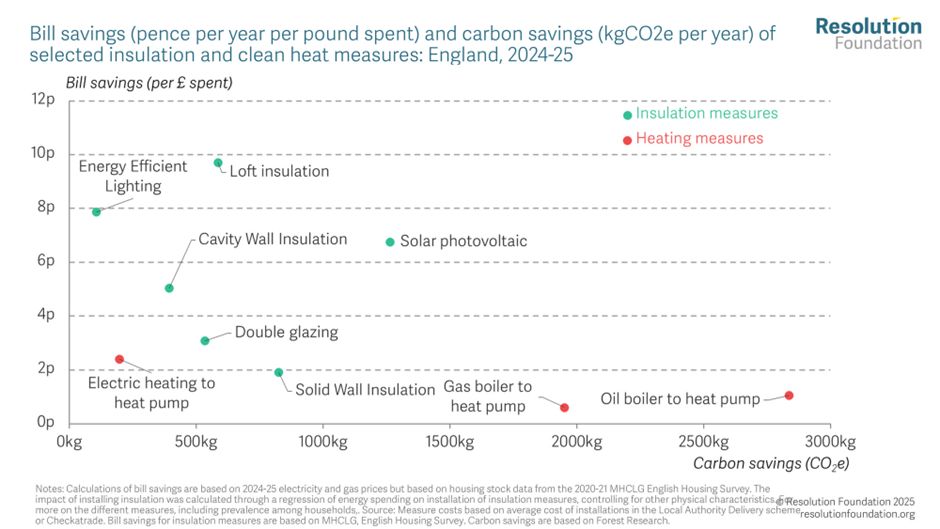
August 7, 2025 at 11:00 AM
What – The Government has to balance spending on insulation and clean heating. These don’t have the same implications for living standards: some are far better at cutting bills and some much better at reducing emissions
How – The Government is toying with three approaches to ensuring grants reach vulnerable households. We find that one based on household incomes performs far better than using benefit eligibility or area-based eligibility

August 7, 2025 at 11:00 AM
How – The Government is toying with three approaches to ensuring grants reach vulnerable households. We find that one based on household incomes performs far better than using benefit eligibility or area-based eligibility
Who – while poorer households are no more likely to live in badly insulated homes, they will get a greater living standards boost from energy efficiency improvements. This means capital spending should be focussed on them

August 7, 2025 at 11:00 AM
Who – while poorer households are no more likely to live in badly insulated homes, they will get a greater living standards boost from energy efficiency improvements. This means capital spending should be focussed on them
Higher energy bills driving today's inflation figures, with changes in fuel costs behind nearly 90% of the year-on-year increase.
Policies that pay for environmental and social schemes (among other things) up a bit too but nowhere near as much
Policies that pay for environmental and social schemes (among other things) up a bit too but nowhere near as much

May 21, 2025 at 9:21 AM
Higher energy bills driving today's inflation figures, with changes in fuel costs behind nearly 90% of the year-on-year increase.
Policies that pay for environmental and social schemes (among other things) up a bit too but nowhere near as much
Policies that pay for environmental and social schemes (among other things) up a bit too but nowhere near as much
Doing so would really sharpen the incentive to install a heat pump – four fifths of households currently with gas boilers would save more than £300 per year.
Savings on this scale would make heat pumps a much more attractive option
Savings on this scale would make heat pumps a much more attractive option
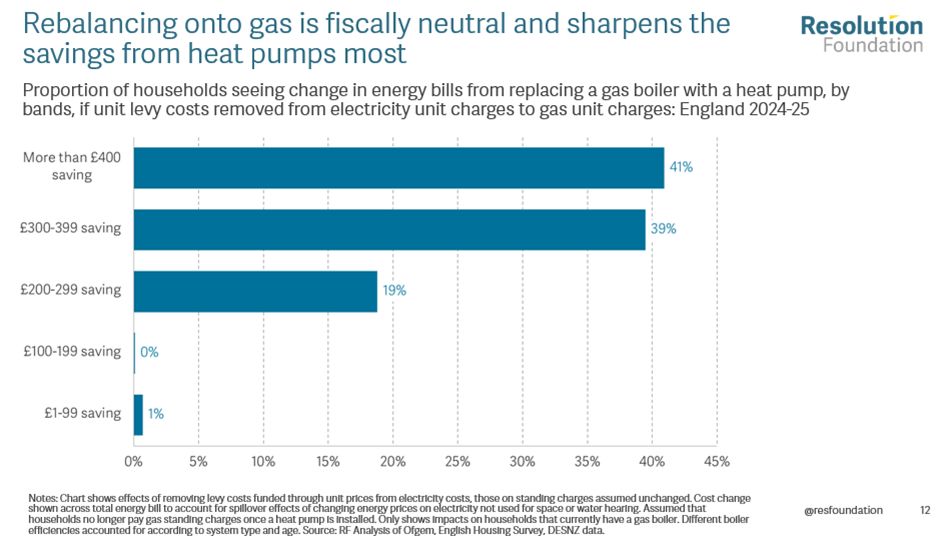
April 10, 2025 at 12:57 PM
Doing so would really sharpen the incentive to install a heat pump – four fifths of households currently with gas boilers would save more than £300 per year.
Savings on this scale would make heat pumps a much more attractive option
Savings on this scale would make heat pumps a much more attractive option
In fact, around two-in-three will face higher bills.
For most, this won’t be a big change, but as it stands there is very little incentive for people to say goodbye to their boilers.
For most, this won’t be a big change, but as it stands there is very little incentive for people to say goodbye to their boilers.
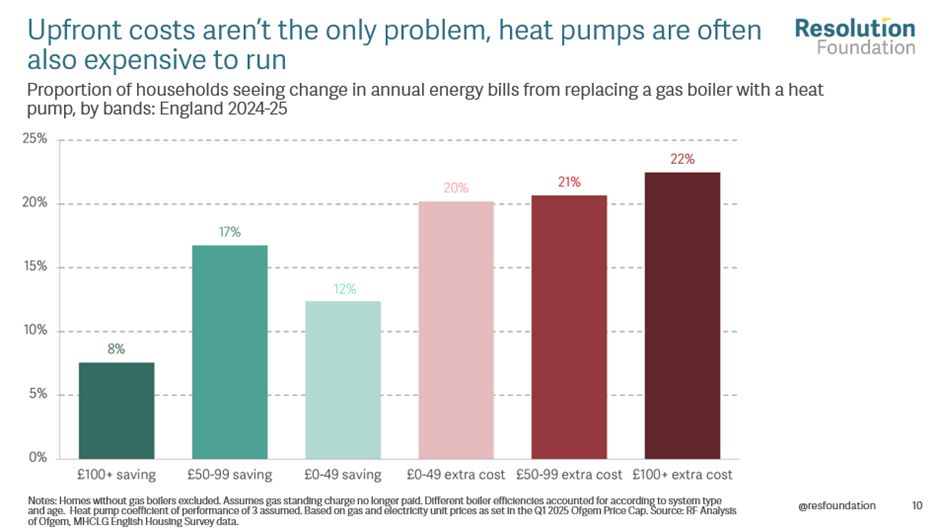
April 10, 2025 at 12:57 PM
In fact, around two-in-three will face higher bills.
For most, this won’t be a big change, but as it stands there is very little incentive for people to say goodbye to their boilers.
For most, this won’t be a big change, but as it stands there is very little incentive for people to say goodbye to their boilers.
And regulation on new homes is also long overdue.
It is remarkable that in 2024 only a small fraction of new builds were fitted with heat pumps – close to three-in-five are still being connected to the gas grid
It is remarkable that in 2024 only a small fraction of new builds were fitted with heat pumps – close to three-in-five are still being connected to the gas grid
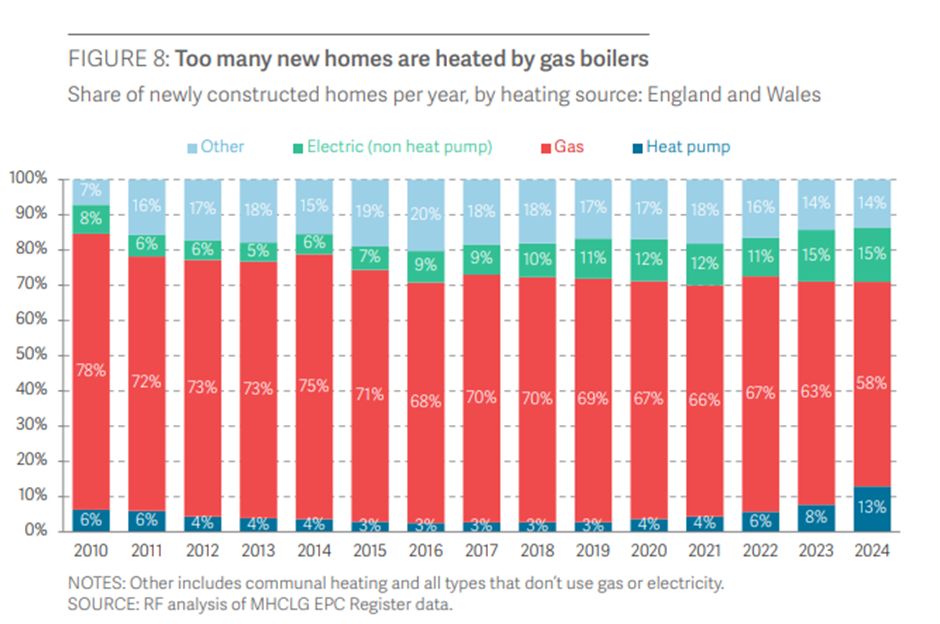
April 10, 2025 at 12:57 PM
And regulation on new homes is also long overdue.
It is remarkable that in 2024 only a small fraction of new builds were fitted with heat pumps – close to three-in-five are still being connected to the gas grid
It is remarkable that in 2024 only a small fraction of new builds were fitted with heat pumps – close to three-in-five are still being connected to the gas grid
We can means test extra support to help poorer families, but the elephant in the room (shown in this chart) is tenure. Most lower income households rent their homes, and landlords have shown little interest in installing low carbon heating
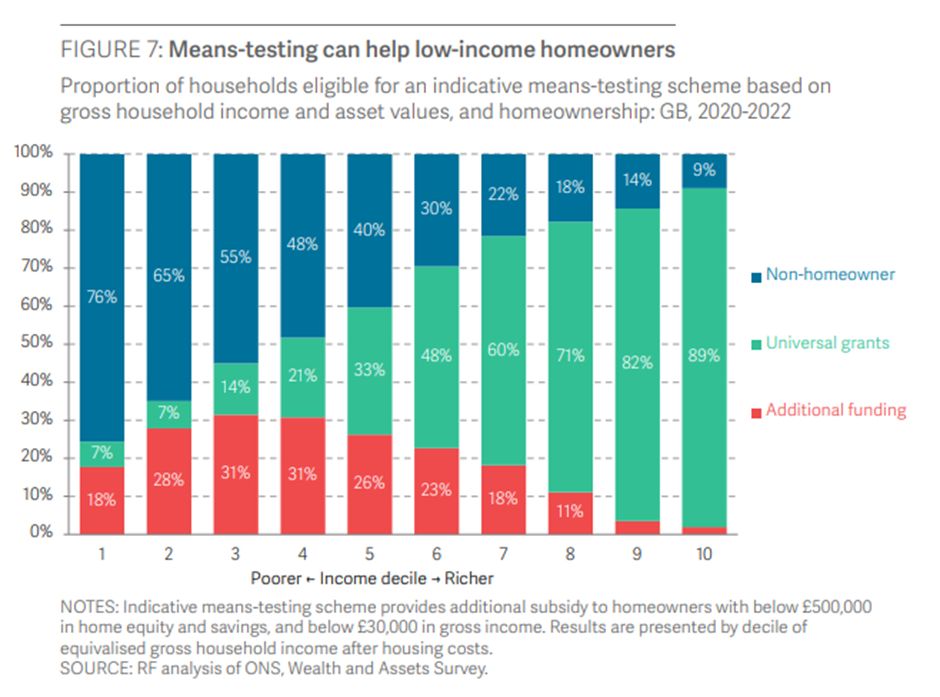
April 10, 2025 at 12:57 PM
We can means test extra support to help poorer families, but the elephant in the room (shown in this chart) is tenure. Most lower income households rent their homes, and landlords have shown little interest in installing low carbon heating
First, we need to acknowledge that costs aren’t coming down as hoped. Even after big grants and tax cuts, unsubsidised installation prices have barely fallen
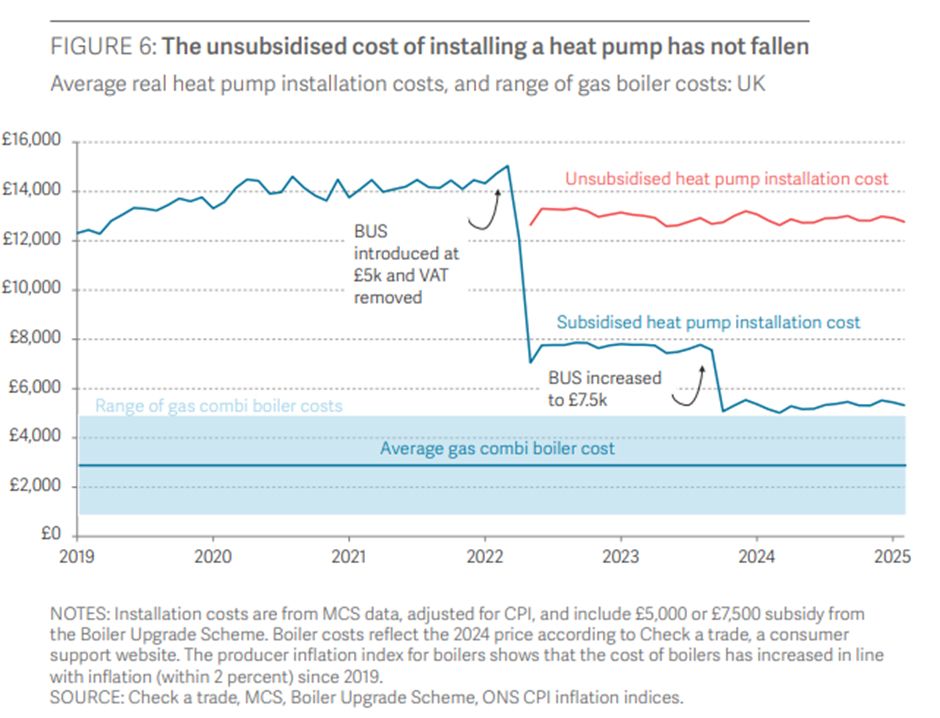
April 10, 2025 at 12:57 PM
First, we need to acknowledge that costs aren’t coming down as hoped. Even after big grants and tax cuts, unsubsidised installation prices have barely fallen
Heat pumps are expected to heat most homes by mid-century. This won’t happen if these trends don’t start to change
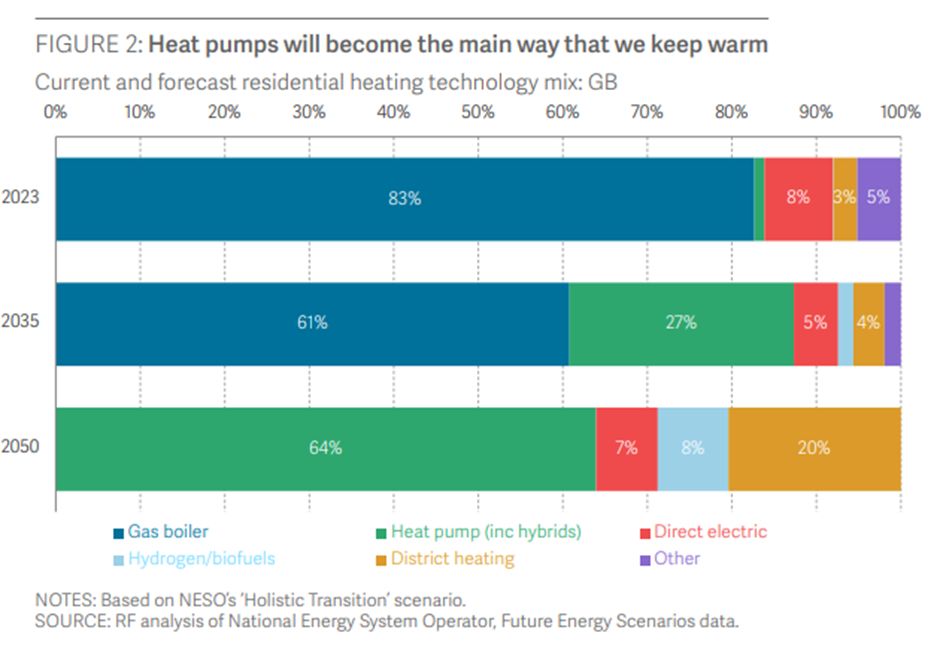
April 10, 2025 at 12:57 PM
Heat pumps are expected to heat most homes by mid-century. This won’t happen if these trends don’t start to change
It’s well known that the heat pump rollout is going slowly, but it is remarkable how unbalanced it is. Using postcode-level installation data we can see that richer and more rural parts of the country dominate
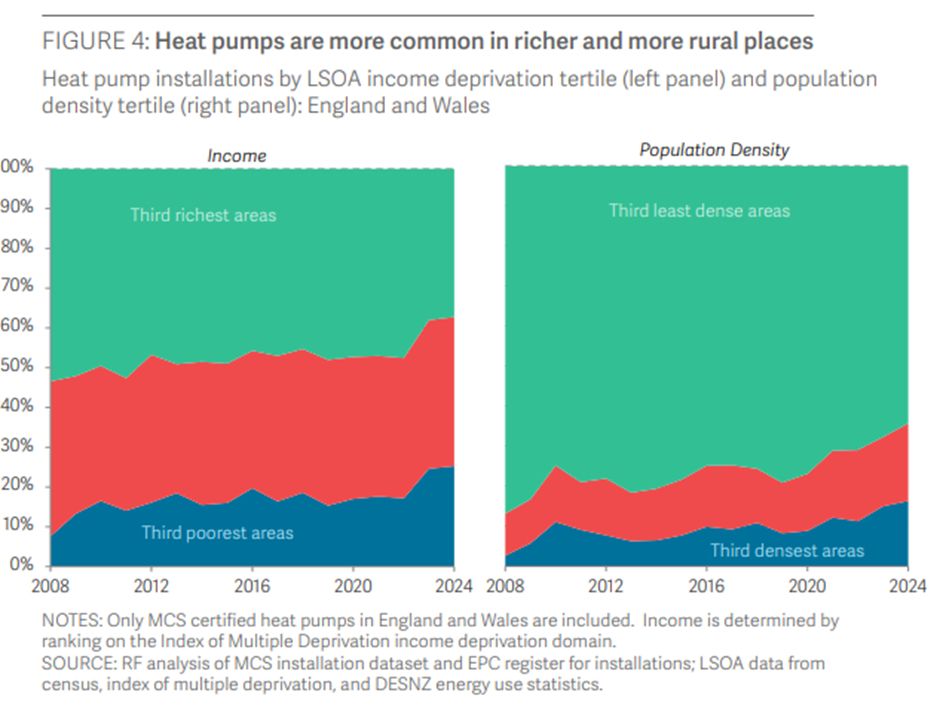
April 10, 2025 at 12:57 PM
It’s well known that the heat pump rollout is going slowly, but it is remarkable how unbalanced it is. Using postcode-level installation data we can see that richer and more rural parts of the country dominate
It's also widely reported that poorer places are being left behind when it comes to public EV chargers
But when we look at on-street chargers (the most important type for widespread EV uptake) we can see that this just isn't true
But when we look at on-street chargers (the most important type for widespread EV uptake) we can see that this just isn't true

January 8, 2025 at 10:34 AM
It's also widely reported that poorer places are being left behind when it comes to public EV chargers
But when we look at on-street chargers (the most important type for widespread EV uptake) we can see that this just isn't true
But when we look at on-street chargers (the most important type for widespread EV uptake) we can see that this just isn't true
There is no real reason why PPM customers could not be given cheaper energy rates – tariffs were changed in the energy crisis and they could be again 6/
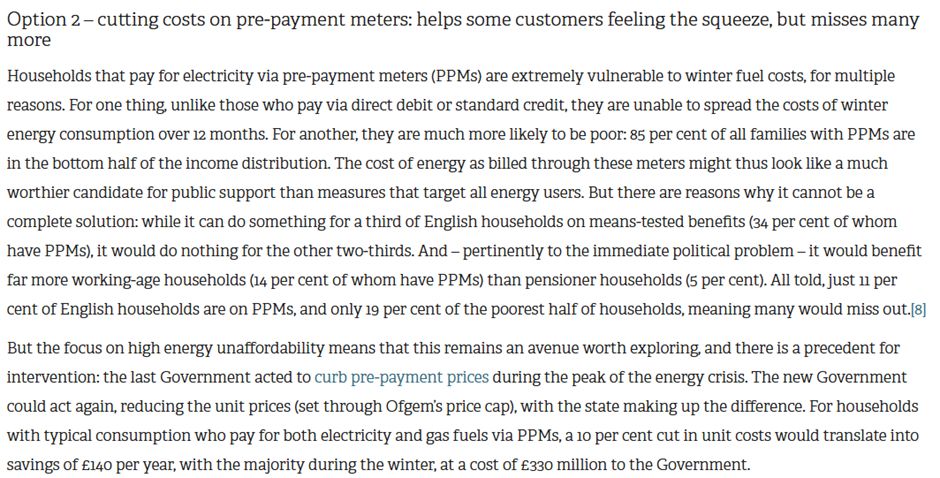
January 8, 2025 at 9:32 AM
There is no real reason why PPM customers could not be given cheaper energy rates – tariffs were changed in the energy crisis and they could be again 6/
Which explains why disconnections and debt (that continues to increase even if PPM customers don’t use any energy) are unsustainably high 5/
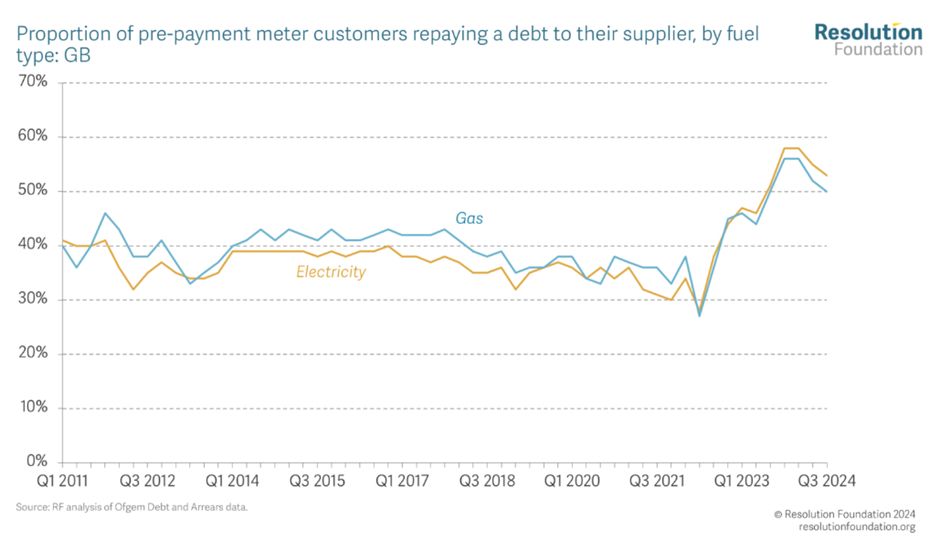
January 8, 2025 at 9:32 AM
Which explains why disconnections and debt (that continues to increase even if PPM customers don’t use any energy) are unsustainably high 5/
A thread on why the Government shouldn’t relax its targets on electric car sales

November 27, 2024 at 9:41 AM
A thread on why the Government shouldn’t relax its targets on electric car sales
We keep hearing in the media that discounts being offered on EVs are ‘unaffordable’. To what extent is that actually true?
If discounted EVs are being cross subsidised by higher retail prices on petrol cars then the mandate is working as designed.
If discounted EVs are being cross subsidised by higher retail prices on petrol cars then the mandate is working as designed.

November 18, 2024 at 12:05 PM
We keep hearing in the media that discounts being offered on EVs are ‘unaffordable’. To what extent is that actually true?
If discounted EVs are being cross subsidised by higher retail prices on petrol cars then the mandate is working as designed.
If discounted EVs are being cross subsidised by higher retail prices on petrol cars then the mandate is working as designed.
Many EVs are cheap now, with lease payments that are comparable to what middle-income drivers spend on cars. Why is more subsidy needed?

November 18, 2024 at 12:03 PM
Many EVs are cheap now, with lease payments that are comparable to what middle-income drivers spend on cars. Why is more subsidy needed?

